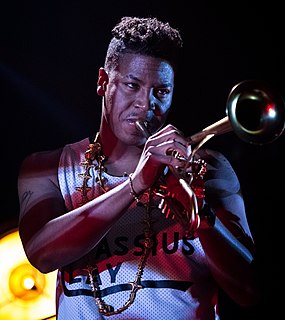Top 30 Quotes & Sayings by Christian Scott
Explore popular quotes and sayings by an American musician Christian Scott.
Last updated on December 21, 2024.
What we're doing now, is to try to eradicate the limited notion of how people are interacting with each other through hyper-racialized ideas. A lot of it deal with, as an example, genre. If I ask you to visualize a trap musician or a hip-hop musician, you'll see one thing. If I say visualize a western classical musician, you'll see a very different thing. A lot of how music is disseminated to us is hyper-racialized. It's not something that we think about all the time, but if you take a minute to look back, it's why you get this argument when there's a white rapper.
Anyone should be able to express themselves in any context. Obviously, there are arguments against appropriation, but it's one thing when someone is doing something for satire or making fun of a culture, but if they respects the tenets of the culture and they want to be a part of that, what could be more beautiful than that?
I liked trumpet because it's related to boxing, but also it has a capacity to create a different type of beauty. There are fight fans, people who want to see that, but what they're really there to see is pretty rough. They're there for blood, which is fine. It's part of it. I enjoyed having the same type of internal, mental, physical fight, but enduring that sort of trauma or pain to send a message of love. I can still have the fight, but what I'm fighting for is more a reality that I want to create.
People call what we do "stretch music." This is our style, and one of the newer, in vogue ways of playing creative, improvised music. It really grew out of me trying to address something that I saw in my everyday life in my neighborhood - trying to develop that and refine that and excavate exactly what that was in a way that, when I communicated it, it was palpable and easily read. That started really early. Why it started was from something that I was really angry about.
I was a really good youth boxer, and I enjoyed the sport very much. Once I actually started to play the trumpet, it is very similar to boxing. Most of the great trumpet players boxed: Miles Davis was a boxer, Wallace Roney is a boxer, Terrence Blanchard is a boxer. In a boxing ring, no one can help you. It's just you and the other guy, and your job is to get him out of there, to outscore him in the best sense of it. When you learn to box, the first thing they teach you is to protect yourself at all times, and some people also learn that they like being hit.




















